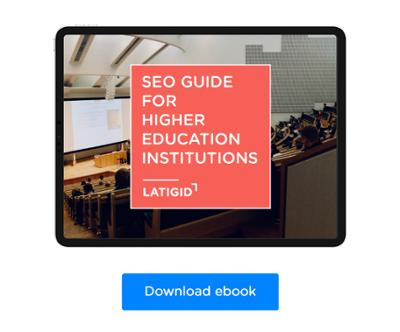
A well-crafted higher education marketing strategy can make all the difference in reaching prospective students, engaging them, and ultimately driving enrollment. In this article, we will explore the key steps to developing a successful higher education marketing strategy that can help institutions thrive in the digital age.
What is higher education marketing?
Higher education marketing is a specialized form of marketing that focuses on promoting and advertising institutions of higher learning, such as colleges, universities, and vocational schools. The primary goal of higher education marketing is to attract prospective students, engage with them, and ultimately convince them to enroll in the educational programs offered by the institution. This field of marketing is highly competitive, and universities and colleges employ a range of strategies and tactics to stand out in a crowded market. Higher education marketing aims to achieve several key goals, including:
-
Attracting new students: Higher education institutions compete for students in a crowded market, so it is crucial to develop effective marketing strategies to attract prospective students. This may involve highlighting the institution's unique strengths, such as its academic programs, campus life, or career services.
-
Engaging current students: Current students are a valuable asset for any college or university, as they can serve as ambassadors and influencers. Higher education marketing can focus on engaging current students through social media, campus events, and alumni programs.
-
Retaining students: Higher education institutions want to ensure that their students continue their education and graduate. Marketing efforts can focus on highlighting the benefits of staying enrolled, such as networking opportunities, career preparation, and personal growth.
-
Raising brand awareness: Higher education marketing aims to establish a strong brand identity for the institution. This involves communicating the institution's values, mission, and culture to potential students, parents, and other stakeholders.
Related article: Top Higher Education Digital Marketing Strategies for 2024
How to develop a successful higher education marketing strategy
Developing a successful higher education marketing strategy is crucial for universities and colleges to attract and engage prospective students effectively. Here are the steps to create a winning higher education marketing strategy:
Understand your audience
The first and most crucial step in creating a successful higher education marketing strategy is to understand your target audience. Different institutions cater to diverse student populations, each with unique needs, interests, and motivations. Conduct thorough research to gain insights into your prospective students, including demographics, interests, challenges, and aspirations. This will serve as the foundation for tailoring your marketing efforts effectively.
Define your unique selling proposition (USP)
Every university or college has something unique to offer. Identifying and highlighting your institution's unique selling proposition (USP) is essential for standing out in a crowded market. What sets your institution apart? Is it your academic programs, faculty expertise, campus facilities, or a strong alumni network? Define your USP clearly and use it as the core message in your marketing materials.
Build a strong online presence
Develop a user-friendly and responsive website that provides valuable information for prospective students. Use social media platforms, email marketing, and content marketing to engage with your audience and showcase your institution's strengths. Regularly update your website and social media profiles with relevant and engaging content.
Create high-quality, informative, and engaging content
Content is king in the digital marketing realm. Create high-quality, informative, and engaging content that addresses the needs and interests of your target audience. Blog posts, videos, infographics, and webinars can be powerful tools for showcasing your institution's expertise and creating a connection with prospective students. Consistency is key; maintain a regular posting schedule to keep your audience engaged.
Related article: Creating a Winning Content Marketing Plan for Higher Education
Leverage search engine optimization (SEO)
Optimizing your online content for search engines is essential for increasing your visibility in search results. Conduct keyword research to identify the terms and phrases prospective students are using to search for educational institutions. Optimize your website, blog posts, and other online content accordingly. High-quality, SEO-friendly content can drive organic traffic to your website and increase your institution's visibility.
Embrace paid advertising
While organic efforts are crucial, paid advertising can complement your marketing strategy effectively. Platforms like Google Ads and social media advertising allow you to target specific demographics and interests, ensuring that your ads reach the most relevant audience. Set clear objectives, budgets, and timelines for your paid advertising campaigns to maximize their effectiveness.
Implement analytics and data tracking
To measure the success of your marketing efforts, it's essential to implement analytics and data tracking tools. Google Analytics and other tracking software can provide valuable insights into website traffic, user behavior, and the performance of your marketing campaigns. Regularly analyze this data to make informed decisions and adjust your strategy as needed.
Engage with prospective students
Engagement is key to building relationships with prospective students. Respond promptly to inquiries and provide personalized information and guidance. Consider hosting virtual open houses, webinars, or campus tours to give potential students a glimpse of campus life and academic offerings. Building a sense of community and belonging can greatly influence a student's decision to enroll.
Leverage alumni and current students
Your current students and alumni can be powerful advocates for your institution. Encourage them to share their positive experiences on social media and participate in recruitment efforts. Alumni success stories can be particularly compelling in showcasing the value of your education.
Adapt and evolve
The higher education landscape is continually evolving, and so should your marketing strategy. Stay informed about industry trends, technological advancements, and changes in student preferences. Be willing to adapt your strategy to remain competitive and relevant.
Developing a successful higher education marketing strategy requires a deep understanding of your target audience, a clear USP, a strong online presence, and a commitment to continuous improvement. By following these key steps and staying agile in your approach, your institution can attract and retain the right students while thriving in the competitive world of higher education. Remember that building a positive reputation and delivering on your promises are equally important in the long-term success of your institution.
Related article: Boosting Enrollment in Higher Education Through Digital Marketing
About LATIGID
We are a higher education marketing agency. We help you grow by increasing website traffic, generating more student leads, and closing those leads into enrollment. With a deep understanding of the latest industry trends and best practices, we are well equipped to help your institution grow.
If you are looking for a higher education marketing agency to partner with, check our page to see what we can do for you!
Download our SEO guide and learn how to build a strategy to optimize your Higher Education Institution's website






